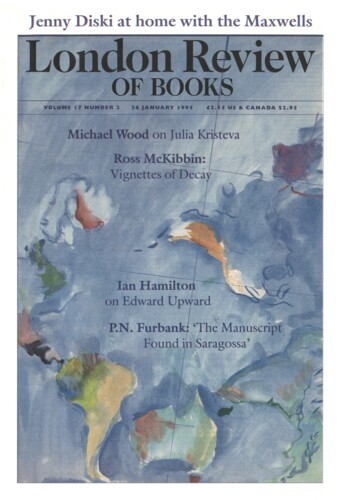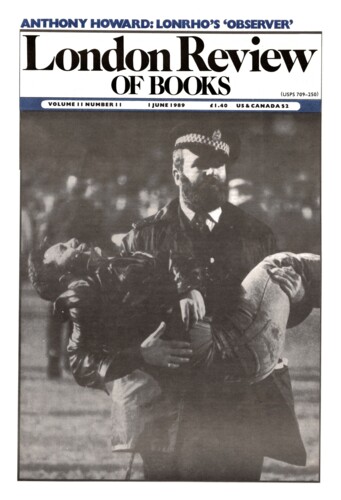David Nokes
David Nokes Jonathan Swift: A Hypocrite Reversed won the James Tait Black Memorial Prize for biography in 1985. He is a senior lecturer in English at King’s College london.
Sometimes a Cigar Is More Than a Cigar
David Nokes, 26 January 1995
A recent ‘free uncensored’ supplement to Company magazine featured a display of 29 male bottoms. ‘How’s this for bare-faced cheek!’ it proclaimed above this set of ‘spanking pics of real-life bums’: slim bums and flabby bums, muscly bums and pimply bums, hairy bums and smooth bums. Pornography has always had an obsession with comparisons and quantifications. It has often seemed more fascinated by quantity than quality. How many inches? How many times? How many positions? How many partners? Aretino’s Postures (1524), the first widely-circulated work of Renaissance pornography, featured an engraved display of 16 sexual positions; within a decade pirate copies had expanded this modest range to 35 or even 44 bodily configurations for the ‘sacrifice to Saint Fuck’. Don Giovanni’s boast of 1003 Spanish conquests is a priapic tribute to Enlightenment notions of l’homme machine; just as Rowlandson’s fascination with erections of Brobdingnagian proportions represents a triumph of Enlightenment hubris over the age-old anxieties of the male inchwar. (Company deals briskly with such male fantasies: ‘Sorry guys, we know the truth. The ten-inch penis is, sadly, very, very rare. The average man’s pride and joy is 4", rising to 5" to 7" when fully erect.’ It’s not clear if we’re supposed to feel deflated or reassured by these statistics.)
Cheating his mother-in-law
19 April 1990
David Nokes on the duality of Defoe
David Nokes, 19 April 1990
In many ways, Paula Backscheider has written a highly appropriate life of Defoe. Fat, fact-filled and repetitious, her book offers a meandering narrative of merchant adventures and spying, opportunism and piety, taking us from fire and plague to bankruptcy via the battlefield of Sedgemoor, Newgate prison and the pillory. It is, in other words, much like a novel by Defoe. The one essential difference is that at the heart of all Defoe’s novels there is a voice, the beguilingly candid tones of a first-person narrator skilfully blending puritan confessional with con-man’s patter to impose a rhetorical identity upon the turmoil of events. It is not merely that Professor Backscheider’s book inevitably lacks the strong dramatic unison of such an autobiographical persona. More disappointingly, she seems uncomfortable describing, or attempting to account for, the virtuoso feats of moral and political ventriloquism which render Defoe’s true ‘identity’ a reverberating compromise between rhetorical fantasy and documentary fact.
The Amazing Mrs Charke
David Nokes, 1 June 1989
In her ingenious ‘autobiography’ of Delariviere Manley, A Woman of No Character (1987), Fidelis Morgan contrived an effect of literary trompe l’oeil. Artfully interweaving extracts from Manley’s ‘secret histories’, The Adventures of Rivella (1714) and The New Atalantis (1709), with passages of factual commentary, she offered a counterfeit self-portrait of a woman whose true identity might best be represented as a series of fictional impostures. Irene von Treskow’s cover illustration confirmed the sense of life as performance: ‘Manley’, disguised in the black robes of a duenna, peeps, half-veiled and half-barefaced, from behind her fan. In her autobiographical Narrative (1755) Charlotte Charke similarly describes herself as ‘playing at bo-peep with the world’, but Morgan’s role in this new co-production, The Well-Known Troublemaker, has switched from impersonator to impresario. In her commentary she confines herself to acting as prologue, epilogue and cheer-leader to Charke’s theatrical memoirs. The book’s cover illustration, depicting the infant Charke dressed in the borrowed robes of her father, Colley Cibber, introduces the twin themes of performance and disguise. Like Gulliver among the Brobdingnagians, the diminutive Charke in knee-length wig, cocked hat, dragging a giant broadsword, affects an absurd kind of strutting dignity, while behind her the local peasants hold up their hands in amazement at this lusus naturae.
Pieces about David Nokes in the LRB
Pay me for it: Summoning Dr Johnson
Helen Deutsch, 9 February 2012
On Saturday, July 30, Dr Johnson and I took a sculler at the Temple-stairs, and set out for Greenwich. I asked him if he really thought a knowledge of the Greek and Latin languages an essential...
Simplicity: What Jane Austen Read
Marilyn Butler, 5 March 1998
Do we need another Life of Jane Austen? Biographies of this writer come at regular intervals, confirming a rather dull story of Southern English family life. For the first century at least, the...
Liveried
Frank Kermode, 11 May 1995
Like most biographies nowadays, David Nokes’s John Gay is very long, but unlike some of the others it is not much longer than it needed to be. Gay devoted so much of his attention to people...
Was Swift a monster?
Denis Donoghue, 5 June 1986
The main problem for David Nokes or for any other biographer of Swift is that the agenda has already been prescribed. Within a few years of Swift’s death in 1745, questions were raised...
Read anywhere with the London Review of Books app, available now from the App Store for Apple devices, Google Play for Android devices and Amazon for your Kindle Fire.
Sign up to our newsletter
For highlights from the latest issue, our archive and the blog, as well as news, events and exclusive promotions.



